#literary forgeries
Photo

Apocrypha and Pseudepigrapha
In the 2nd century CE, as Christianity was in the process of becoming an independent religion, a body of literature emerged that scholars classify as apocrypha and pseudepigrapha. Apocrypha (Greek: apokryptein, "to hide away") are those books considered outside the canon, meaning that they were not included when the New Testament became official after Constantine’s conversion to Christianity.
Pseudepigrapha ("false writing") were bluntly forgeries. They were written or pretended to be written in the name of a past famous person to provide credibility. Jews utilized this literary device, in their apocalyptic texts that pretend to be written by Enoch, Moses, and Abraham. Because they were in heaven, they were sources of both traditional and hidden secrets.
Christian religious expression encompassed ecstatic behavior, such as "speaking in tongues," spirit possession resulting in prophecy, and developed rules and regulations on uses of the body. Christian behavior was framed with the concepts of celibacy (no marriage contract) and chastity (no sexual intercourse) as ideal behavior. Charis ("gifts") were understood as gifts from the spirit of God. Scholars describe this literature as a particular point of view known as 'charismatic Christianity.' In these stories, the concept of charismatic gifts provided the background for the performance of miracles, healings, and conversions. All of the Christian characters remain chaste and celibate.
The Infancy Gospel of Thomas
People wanted to know more details about the movement. Only Matthew and Luke provided the birth story of Jesus of Nazareth, but then they moved directly to the ministry. What was Jesus like as a child? Did he know from the beginning that he was the messiah? The Infancy Gospel of Thomas answered those questions. The writer of this text remains unknown, but it was assigned to an early missionary named Thomas. For many modern Christians, the child Jesus is not what they expect; this is a portrait of what we would now deem a super-brat.
In the ancient world as well as the modern, people believed that great men must have had an unusual birth and childhood, where they showed early signs of being a prodigy. This was the case with the young Jesus. The text opens with Jesus playing in the mud (like all children). He fashioned the mud into birds which flew, but when Jesus played with the other boys on the street, he got mad and struck one dead. The parents came to Mary and Joseph with a plea to control their child, and so they tried to find him a tutor, but of course, Jesus was smarter than all of them.
One day a neighbor boy fell off a roof and died. Everyone blamed Jesus, so he then resurrected the boy from the dead (a preview of his later activity as an adult). This text does have a happy ending; Jesus went back and resurrected the first boy he struck down. The overall purpose of the text is to show the young Jesus (who has great power) learning eventually to control his gifts to be used for the salvation of humankind only and not his own interests.
Continue reading...
54 notes
·
View notes
Note
Krisnix and cykesquill?
Krisnix (I Ship it)
What made you ship it?
Projecting onto Kristoph. I first started to be curious about the ship at about the same time that I got into the fandom a few years ago. Discovering the k*nk meme was pretty groundbreaking for me in terms of introducing me to a lot of ships that I might not otherwise have considered. (As I believe I've mentioned, I'm pretty indifferent to both narumayo and narumitsu so I was definitely looking for other pairings to get into besides the obvious slash option and obvious het option). Krisnix started appealing to me pretty quickly due to the inherent tragedy and drama of such a ship. However, it took me finding fanworks that leaned more into Kristoph as a comedic and/or tragic character (as opposed to just him as the designated evil villain in endgame narumitsu) and emphasized his vulnerabilities that really got me into the pairing. I really credit the Count of Monte Cristo AU, the Frozen AU, and these two pieces of fan art for really getting me to latch onto a more nuanced, emotional Kristoph and to the ship.
2. What are your favorite things about the ship?
As a former English major, I tend to get feral over ships that utilize some of my favorite literary devices. And there is so much to work with for krisnix. The "doomed by the narrative" trope, particularly given that the fact that Kristoph's actions even before they met inevitably doomed any relationship (romantic or otherwise) that they might have had before it even began. Not to mention Phoenix's savior complex vs. the man who it is too late to save.
There's this sense of Kristoph as a dark mirror/foil of Phoenix, and given that Kristoph's influence canonically brings out a very dark side ( hidden cameras, forgeries, manipulation) of the otherwise "heroic" Phoenix, I like to contemplate that the reverse may have been true as well--that Phoenix's "light" might have penetrated Kristoph's darkness even if only a little and if it was already too late. The yin-yang potential fascinates me. I also love the fire and ice imagery motif that surrounds them.
I also love the intriguing possibilities of the 7-year gap--the opportunities for closeness, catching feelings in spite of one's self in a way that is all but inevitable when you spend so much time together, the idea of Kristoph at least somewhat co-parenting Trucy with Phoenix, wondering exactly how much of their "dinners" were genuinely for mutual surveillance and how much was because they grew to enjoy each other's company, speculating as to when Phoenix realized Kristoph was involved in his disbarment (my headcanon is less than a year) and if Kristoph ever realized Phoenix was on to him.
They're also so weird about each other in a way that's so interesting to me. The solitary cell scene is frankly bizarre in a lot of ways, but I am always taken aback by how quickly the two of them fall into their old rapport. Kristoph is literally in a jail cell because of Phoenix, and yet they are super polite and friendly to each other. Honestly, Kristoph in this scene seems far more upset about the idea that Phoenix's "friendship" might have had ulterior motives from the start than he is about the fact that said false "friendship" resulted in Kristoph's incarceration. (Phoenix's bringing up their friendship, trying to snoop in Kristoph's mail, and questioning why Kristoph killed Zak are the only times in this scene that Kristoph's facade slips. Otherwise, they're just bantering like old times. Why are they this weird? I don't get it but I love it anyway).
I also love a lot of the relationship tropes that the ship plays into: uptight loves impulsive; repressed loves outspoken; contrasting visual aesthetics; fake relationship/becoming the mask; foe yay; things we left unsaid; the enemies-to-friends-to-lovers-and-not-necessarily-in that-order pipeline. It's all so good.
3. Is there an unpopular opinion you have on your ship?
The unpopularity of this opinion has fluctuated over time, but when I first started shipping krisnix, there were really strong fanon for all of the following: 1. Top and/or Dom Kristoph who liked subjecting poor poor Phoenix to times that were neither fully safe, fully sane, and/or fully consensual. 2. Helpless cinnamon roll woobie Phoenix who has NO IDEA about Kristoph's various crimes until a Savior™ (usually Miles, occasionally Apollo, Trucy, or Maya) comes and explains the plot to him even though canon implies he puts this together on his own and pretty quickly. 3. Kristoph is a generic sociopath incapable of any real feeling and diabolically clever who gets off solely on POWAH and does evil for evil's sake.
None of these headcanons/interpretations had any appeal or rang true for me, so it was hard for me to interact even with some of the people who shipped it because they shipped in in the opposite way/ for opposite reasons that I did. I even had someone tell me in no uncertain terms that I was shipping it "wrong" for headcanoning a more vulnerable, conflicted, nuanced Kristoph who wasn't a pure one-dimensional generic villain, who had real and genuine feelings (both for Phoenix and in general) , and who was overall more likely to be submissive and/or a bottom than dominant and/or a top.
As I have said, fanon de jour has fluctuated significantly overtime and more and more people who headcanon/prefer a Kristoph more similar to the version that I enjoy have come out of the woodworks and shared their fanworks/head canons/meta with the world. (*Waves affectionately to all my beloved krisnix frens and mutuals. You know who you are. *) That being said, with the release of the AA 4-6 Trilogy port, I have noticed another shift within the larger fandom towards the "Hello Naughty Phoenix, It's Murder Time" Kristoph interpretation again, which makes me rather sad/anxious. I just wanna be able to project onto and shamelessly woobify the pathetic blond blorbo without worrying about people telling me I'm not allowed in the krisnix sandbox anymore. And like I think I'm probably safe enough but there's still a little fear.
Cykesquill (I Ship It...albeit much more casually)
What made you ship it?
A combination of being somewhat indifferent about the fandom-preferred ships for them (Juniper or occasionally Apollo for Athena; Nahyuta for Blackquill) , the fact that I already actively shipped Athena in a similar-ish pairing that is just as (if not more) "problematic," and the fact that telling me I am not "allowed" to ship something/shouldn't ship is far more likely to encourage me to ship it than actively deter me. Also I project pretty heavily onto Athena so naturally I'd be drawn towards ships that are narratively and thematically interesting for her.
What are your favorite things about the ship?
I tend to be especially drawn towards ships that are (or have the potential to be) agents of narrative/character development for the characters as individuals. And this is especially the case for Athena and Simon. They were quite literally created with and for each other.
You can't really think or talk about Simon Blackquill without first talking about Athena Cykes--about the fact he was willing to risk and even give up his life to protect a sensitive, frightened child from an experience (prison and/or execution) that would've destroyed everything about her. You can't really think or talk about Athena Cykes without talking about Simon Blackquill--about the brave, kind young man who comforted and protected her when no one else would but who wouldn't let her comfort and protect him back.
Everyone always talks about the impact that narumitsu have on each other, and I'll admit that they do. But the thing is...there are other people in Phoenix's and Miles' lives that have had as greater or greater an impact on each of them than they have on each other. (Mia, Maya, Dahlia, Trucy, debatably Larry, Apollo, or Kristoph for Phoenix; Gregory, von Karma, Gant, and debatably Kay, Gumshoe, and Ziska for Miles).
For Athena and Simon, there's really no contest, they are the single most important and impactful person in each other's life. Yes, Apollo, Phoenix, and Juniper also influenced Athena. Yes, Fullbright, Metis Aura, and the spoiler character also influenced Simon. But none of them did so to the level that Athena and Simon influenced each other. To quote Wicked, "Who can say if I've been changed for the better? (I do believe I have been changed for the better.) But because I knew you, I have been changed for good." That's it; that's them.
Additionally, they do have some other tropes that I enjoy: grump and sunshine (though Athena is so much more complex and complicated than just a "sunshine" and Simon can also be much more playful than the typical grump); the couple that saves each other; contrasting visual aesthetics; height difference; "we're both hella neurodivergent albeit in different ways,"
Is there an unpopular opinion you have on your ship?
The fact that it's a valid ship in the first place? I've legit seen the argument that you can't ship it because hypothetical future step-incest. Which is absurd in and of itself but especially cause it's presuming a reality that could not possibly exist. One where Metis not only lives (so we're starting off very canon-divergent) but also returns Aura's feelings, assumes that because they love each other that they would of course have to get married (which not every couple want) and therefore Simon now is hypothetically Athena's step-uncle in the future and this possible reality should be treated as such even if it doesn't exist. And just if you have to conceive of so many steps in order to justify why not to ship a pairing, maybe your case against isn't as strong as you think. Also very curious to hear what OP thinks of double-in-law marriages (ex: Person A marries Person B and then Person B's sibling marries A's sibling) because like those exist in real life???
send me a ship and I’ll answer three questions based on if I ship it or not.
#ace attorney#krisnix#cykesquill#send help i'm having the feels about how Takeshi Yamazaki does characterization and inter-character relations#again#of course#i can't think too long about aai 2 or dual destinies or i'll go feral english literature major#this man just...he understands how to tie together characters with the Themes™#and that's frustratingly rare in this day and age#i hope he's thriving now that he's moved on from capcom#ofc i still love shu takumi too and I will be ever grateful for his giving me krisnix#aa salt#but like barely apart from thumbing nose vaguely in the direction of n@rumitsu and anti-cykesquills
15 notes
·
View notes
Text
john dehlin's interviews with david bokovoy on literary/textual criticism of the bible are super interesting in general, but i like how he talks about how you don't even need to know the first thing about the joseph smith papyri or the circumstances of its composition to know the book of abraham is a forgery--it's obvious from purely internal textual evidence alone that you cannot square it with any of the other books of the bible, even if you know comparatively little about the historical circumstances of the composition of the book of genesis, so focusing anti-apologetic attempts on the egyptological/archeological evidence is really a sideshow: historically interesting but not at all necessary.
in a later interview he also points out that purely from literary evidence alone we should conclude that there was probably a historical jesus of nazareth on whom the new testament figure is based--he points out that (just as now, really) the 1st century CE jewish expectation of a messiah-figure is so fundamentally contrary to the basic narrative elements of jesus's life that the nascent christian community is trying to rework into the biography of the messiah that it would make absolutely no sense for a purely invented figure. like, if you were going to invent someone (or if traditions were going to accrete around a purely fictitious character) to fulfill the basic characteristics of the messiah, you would think they would get basic assumptions about what the messiah is supposed to do right, and you wouldn't have to invent a completely new theology to make it work--that they did is indicative not of an invented figure, but of a real person for whom inconvenient biographical facts well-known to the community had to be renegotiated and reworked (and even then could only be renegotiated and reworked to a certain point). no one is going to invent a myth about someone who completely fails to meet every expectation of the messiah, as he puts it.
also--it strikes me that mormonism is really fuckin' verbose for a religion adding new scripture. like. okay, islam adds a whole new book (the qur'an), and it's not short, but at the same time it abrogates the hebrew bible and the new testament, so as a muslim you don't need to read those. mormonism adds not only a book longer than the new testament (~269k words to the NT's ~185k in English), the book of abraham, the book of moses, and doctrines and covenants, and the other stuff in the Pearl of Great Price, and it keeps the bible as part of the canon! that's too much damn scripture!
personally i think your religious scripture is more likely to come off as timeless if you keep it short. like, the ideal length of a holy book is the tao te ching (around 20,000 words in English). prophets and shit need to resist the urge to put every single petty grievance into sacred scrolls. save that shit for the commentary.
#the mahabharata is also too damn long#it is around 75% the length of the *entire talmud*#that is Too Much Poetry
42 notes
·
View notes
Text
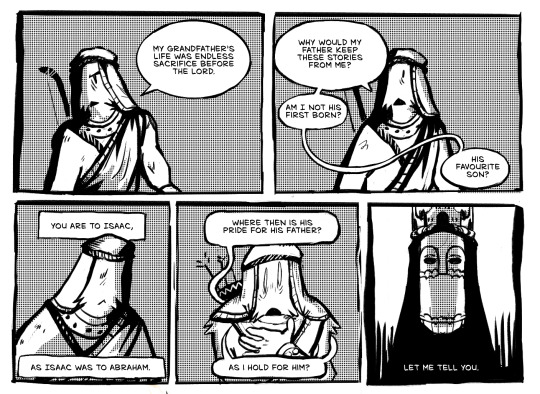
my comic ESAU is now available to purchase as a PDF on itch.io!
ESAU is a short comic about the biblical character Esau from the book of genesis. its based on both the book of genesis and "psuedo-jasher", a literary forgery of the lost biblical text "the book of jasher", or, "the book of the upright".
this is a 10 page comic, and costs £4. this is my first time selling anything online, so if theres any problems let me know!
9 notes
·
View notes
Text
The Engineer's Thumb pt 3
Last we left off, Mr Victor Hatherley, hydraulic engineer and secret giant panda, was accounting how he had ignored very clear and present warnings, almost been crushed to death, had his thumb hacked off by a cleaver and very likely contracted sepsis in a ghost house.
“Here is an advertisement which will interest you,” said he. “It appeared in all the papers about a year ago. Listen to this:
“‘Lost, on the 9th inst., Mr. Jeremiah Hayling, aged twenty-six, a hydraulic engineer. Left his lodgings at ten o'clock at night, and has not been heard of since.'"
RIP Mr Hayling. I hope you died quickly and not in the squishing chamber.
"It is quite clear that the colonel was a cool and desperate man,"
But is he actually a colonel? That's the real question.

There were Sherlock Holmes, the hydraulic engineer, Inspector Bradstreet, of Scotland Yard, a plain-clothes man, and myself.
Ah yes, my dear companions: Sherlock Holmes, Inspector Bradstreet, and *checks hands*... a hydraulic engineer.
How come Victor doesn't get a name here? Hey, ACD, did you forget a character's name in the middle of a story and just couldn't be bothered to look a few paragraphs upwards? I get that Ctrl+F wasn't possible back then, but these short stories aren't that long.
“And you think that they brought you back all that way when you were unconscious?”
I am 90% sure they did not touch him while he was unconscious, they just took him on the carriage in one big circle until they were right back near the station again, and he just woke up where he fell.
“Oh, we shall soon clear up all that,” said Bradstreet. “Well, I have drawn my circle, and I only wish I knew at what point upon it the folk that we are in search of are to be found.”
Right in the middle. Bet you. I mean, you're a fictional character and even if you weren't this was over a century ago. But I bet you metaphysically.
“Oh, yes, you can. This is my point.” He placed his finger in the centre of the circle. “This is where we shall find them.”
“But the twelve-mile drive?” gasped Hatherley.
Knew it! Also, ACD remembered Victor's surname, excellent. Very proud of you! He's been really carefully ignoring it for the last few paragraphs, just not using dialogue tags or saying 'my patient'. Took a minute, but he got there.
“None at all,” said Holmes. “They are coiners on a large scale, and have used the machine to form the amalgam which has taken the place of silver.”
Hey, and I was right about what they were doing. Boom.
Interesting thought... did Hatherley realise this when he was poking around in the press and found the metallic deposits? Because his whole 'I'd like to talk to you about your Fuller's Earth' thing, if he knew about the forgery, sounds a little like 'Hey, how about you cut me in on this', or maybe the opening stages of some blackmailing.
But I'm maligning his character with no evidence. I just wish I knew how he thought that was going to play out. Was he dumb enough to think that nothing illegal was going on? But if he knew something illegal was going on, why call them out on it like that.
But the inspector was mistaken, for those criminals were not destined to fall into the hands of justice.
Again? Holmes has to be the least successful literary detective of all time when it comes to actually catching criminals. Was there not even a convenient shipwreck this time? Although it makes sense they wouldn't stick around when Hatherley's run off with enough information and evidence to get them caught.
As we rolled into Eyford Station we saw a gigantic column of smoke which streamed up from behind a small clump of trees in the neighbourhood and hung like an immense ostrich feather over the landscape.
So, either they're burning the evidence, or they've accidentally burnt themselves to death and that's why they didn't come after Victor - because they were too busy being on fire.
“Dr. Becher's.”
“Tell me,” broke in the engineer, “is Dr. Becher a German, very thin, with a long, sharp nose?”
The station-master laughed heartily. “No, sir, Dr. Becher is an Englishman..."
Becher certainly looks more like a Germanic name than an English name. Also, is this guy really a doctor? And if he's a medical doctor and he lives right next door, then why didn't the station guard last night see Hatherley's bleeding thumbless hand and say 'oh, there's a doctor just 'round the corner. You should have him take a look at that!'
I'm a little confused on the timeline, too. This is all the same day, right. They leave for Berkshire 3 hours after Mr Hatherley finishes his tale, which he tells on the same day he arrives on the train after having lost his thumb. So last night, when the building was on fire, was the night when he was first unconscious, and then sitting at the station waiting for a train. The fire should have been visible from the station if it's that close, and Hatherley didn't get on a train until the morning, so... did no one notice the fire right next door, or did they just not care?

Maybe the fire just wasn't big enough to be seen during the night, so no one outside noticed it until after Victor had left in the morning. Doesn't explain why the guard didn't suggest Victor take his missing thumb to the nearby medical professional, though.
"There can be no question that it was your oil-lamp which, when it was crushed in the press, set fire to the wooden walls, though no doubt they were too excited in the chase after you to observe it at the time."
I forgot about the oil lamp. It's doing a pretty good job of getting rid of the evidence, though.
Early that morning a peasant had met a cart containing several people and some very bulky boxes driving rapidly in the direction of Reading.
Was the word 'peasant' still used in the 1890s? Really? It's a very medieval/dark ages kind of word.
It should at least take them a while to set up again. They're going to need to build another person-squishing machine, and given that they're clearly not very good at hydraulics, I assume they have to kidnap someone to do that for them. Or maybe they just have a diagram that they can follow, but they don't know how it works. And they've left behind all the raw materials, so they'll have to get their hands on that again.
The firemen had been much perturbed at the strange arrangements which they had found within, and still more so by discovering a newly severed human thumb upon a window-sill of the second floor.
The firemen are very sensible people. Although I find it weird that the thumb survived on the windowsill, given that fire was billowing out of the windows in the description earlier.
How our hydraulic engineer had been conveyed from the garden to the spot where he recovered his senses might have remained forever a mystery were it not for the soft mould, which told us a very plain tale. He had evidently been carried down by two persons, one of whom had remarkably small feet and the other unusually large ones. On the whole, it was most probable that the silent Englishman, being less bold or less murderous than his companion, had assisted the woman to bear the unconscious man out of the way of danger.
OK, so they did move him. I was pretty sure that they just didn't find him and he was too out of it on blood loss and adrenaline to know where he'd ended up. Mainly this seems like a really stupid thing for them to do, though. Clearly they've already killed one hydraulics engineer, leaving Victor alive to run away and tell people seems kind of dumb at this point. Obviously not murdering people is the right thing to do, but in this situation it's also a dumb move. No one worked out you killed the last one... eh, what's one more?
“Well,” said our engineer ruefully as we took our seats to return once more to London, “it has been a pretty business for me! I have lost my thumb and I have lost a fifty-guinea fee, and what have I gained?”
“Experience,” said Holmes, laughing. “Indirectly it may be of value, you know; you have only to put it into words to gain the reputation of being excellent company for the remainder of your existence.”
#LifeLessons #LearningExperience
Such a fun story of how he was almost crushed to death and had his thumb chopped off by violent criminals who are still at large!
Yeah, that'll get people to buy you drinks, for sure. Although as previously discussed, you probably won't be alive to enjoy them. And you're going to have to relearn how to do things with only one opposable thumb if you don't die of sepsis. But maybe next time someone tries to warn you three times to not do something, you'll actually listen. Or you can get enough XP to increase your wisdom score and not end up in a situation like this again.

I wonder how many other hydraulic engineers Fritz went on to murder. It was probably fine.
#Letters from Watson#Sherlock Holmes#The Engineer's Thumb#Which actually was seen again#so I was wrong about that one#If he doesn't die from sepsis#Victor Hatherley's immune system is god tier
21 notes
·
View notes
Note
You've mentioned before how this or that ancient Greek text is a later Roman fabrication. How does one know? Can you "just tell", or is some degree of textual forensics required?
There are occasionally cases where you can just tell, either from anachronisms (e.g. a spurious dialogue of Plato that cites a government office established after his death) or works attributed to people who are otherwise agreed to have written nothing or had no writings survive in earlier and better attested traditions (Socrates, Pythagoras) or legendary fictional people (Agathodaemon, Hermes Trismegistus).
Most of the time it's much less cut-and-dried. Linguistic analysis often helps; a lot of the Pythagorean pseudepigrapha is apparently written in an artificial imitation of the Doric dialect of Greek which is essentially Roman period Koine with Doric grammatical forms, somewhat like if someone tried to forge a Shakespeare play today and only had a general sense of Early Modern English. This is far beyond my own ability to assess, but enough people who can read Ancient Greek much better than I can seem to agree on it, with little dissent. A bit of genre awareness helps as well; nearly all of the letters attributed to philosophers and other famous historical figures in the collection Epistolographi Graeci are actually fictional collections that function as epistolary novels, so placing these letters in their cultural context and identifying common literary devices and tropes makes it easier to determine their purpose for being written - the original audience might not have even had any pretext that the letters were real!
Part of the reason I usually only mention it when it's a "later Roman" forgery though is that it gets trickier the less plausible time there is between the date of forgery and the purported author. For example, there are a number of Plato's attributed works that some people don't believe were written by Plato himself, but that everyone generally agrees were written in the 4th century BCE, possibly during Plato's lifetime and possibly by members of his school. It's still possible to do textual forensics there, but in those cases there's rarely anything resembling a consensus, and most of the arguments rely on either dodgy statistical analysis or the interpreter's belief on what constitutes "authentic" Platonic doctrine; as much as I personally like getting into the weeds there, it's usually easier to say "some people have questioned this dialogue's authenticity" for the few dialogues where a significant number of people have done so.
7 notes
·
View notes
Text
Umineko fans of magz followers:
is this good way magz help explain / nudge person that not understand part yet, while on EP7, so of try not outright say answer ?
Am ask because am scramblies n lose track thought / intent what was try say, despite edit for "make sense"
(spoiler imply under readmore)
these are magz message, without put in reply of what other person say (but can guess):
you know how like, "without love it cannot be seen" get repeat a lot in umi
while the "how dunnit" was what those debate n chess games were about they try to expose n nudge the contradiction,
n pattern that keep happening in each game so that can start ask the "why dunnit" n the "why dunnit",
closely intertwined to why beatrice is so keen on tell this story technically she do not feel remembered / seen though... kind of in a literal way
uhh
yeah, battler is kyrie's biological son. but that kind of show moreso how red truths work - "not being asumu's son" was a red herring, because the person beatrice wants to tell this story to is "battler", but "battler" personally defines himself by "being asumu's son" and the sorts of lies/truths he built up over time n mistakes he made from assume this
his assumption n motivations that happened from this, lead to his sin
if that make sense
as in, the way this red truth work - show somewhat how finnicky n overly specific these wording are. no. am even gonna make red truth about this: (red)battler is not kinzo. (/red)
however, kinzo and battler have intentional literary parallels
knox rules only apply thru a mystery interpretation - thus if are treat story as mystery, then would need either follow Knox rules or find reasons why an explanation not violate Knox Rules
yes, are kind of right there yes [context: beatrice love]
also - to find out the How dunnit, then would use Knox rules but it would not necessarily help with why dunnit which is what Willard h. Wright find important, and is try protect / show dignity of
if you stretch the definition - yes, its about lion. but no.
lion is a rare 1 in astronomical chance, of what would be the case if several sins had not had the chance to happen. so they can be used to narrow down what the sins were.
in a sense. could see as being fanfiction, by someone that know the truth, but is half obscure it.
am so sadge
good question
train of thought. lost. one moment
Lion is an answer to one of major "question" the story ask the viewer. n these worlds being combined is for sake of seeing this story being told, from a different angle n to ask different question than was ask in original meta-games
Original meta games were back when viewer / audience n battler were see story as Just "how dunnit".
The reason these story are being shown to Battler (n to viewer), is - can be seen as, because he was the one to deny a type of "answer".
While Battler was also deny the possibility that anyone he knew or should acknowledge, was responsible for what happen in any way. Making him go further away from any resolve wrt "what happened those days".
So basically, his belief "there is no witch, but there has to be a different culprit on island" - deny any possibility that could have happen both on fantastical and mystery level.
While, if was some mysterious additional person, would also deny any connection he had with "culprit", what happened, his sin, etc. - Which why they try make him choose what angle he go with, and initially corner him into realize there no way could be extra person.
But to tackle this "hypocrisy" / "cowardice" when it come to resolve for truth. A truth that involve him, his action, the suffering of those around him, n his acknowledgement of it.
They do so by exploring the worlds made from the forgeries / message in bottles that contradict each other, that were float to shore after Rokkenjima incident n had inspire Witch Hunt conspiracy n true crime speculation fans.
So we are seeing each message. as own world. And those message exist to both scramble the truth, but also say "please keep this story alive". N with these puzzle piece magz have say, am hope that question "why Beatrice want keep story alive" and showing it, and "why Lion exist", and "what the point of these world" - get easier understand
Also like. With the way "cat box" work, because of not have any external confirmation afterward from outside the "cat box" (rokkenjima incident - time and place wise) of what actually happen - the original action of making these different message bottle stories that recount differently, mean that they were all outcomes "that could have happen".
which. even phrase it like that is hint. cuz.
"who wrote those bottle messages and for what. when could they have written the messages and what do that imply about their motive (why dunnit) and intent",
"what sort question lion an answer to",
and "what thing consistent between these different worlds (excluding EP7)",
"what make EP7 world with lion in it special",
and "what sort of person would make all this elaborate setup n story, or have to follow these kinds of rules, just to say what they want say" are another angle - since "what the point" would be nebulous
4 notes
·
View notes
Text
Kickstarter for my novel's new edition
So, uh.
This book is hard to define, genre-wise - which, I understand, is not the best way to start a sales pitch. That is, it is definitely a historical novel, and one with an f/f relationship featured in the background. But other than that - is it a standalone family saga, a Gothic novel of dark family secrets, or (I do like how all-encompassing the name is) just plain literary fiction? You decide!
What it contains:
A sweet sweet corruption arc;
Women's wrongs;
All the Edwardian decadence you could think of, and then some;
Too many spins on real-life scandals of the 1910s to count.
Now, for the blurb proper:
The orphaned Agnes Ashford, once a respectable doctor's daughter, has slid down on the social scale. She had been lucky to find a job as an archivist in a great castle (even if she had to lie and commit a bit of forgery to get it).
However, the position proves a poisoned chalice - the grand family harbours many dark secrets. Instead of running from them, though, Agnes decides that the only way up is to become indispensable to her new masters...
I have written a TV pilot screenplay based on my novel in question, and the screenplay had been chosen for the Quarterfinals in a major international competition, ScreenCraft Screenwriting Fellowship (2023). It did not win, but it still made for a fist-pumping moment!
#writeblr#amwriting#dark academia#writers of tumblr#writers on tumblr#wip#writeblr community#writing community#writing
6 notes
·
View notes
Text
Literary forgery (also known as literary mystification, literary fraud or literary hoax) is writing, such as a manuscript or a literary work, which is either deliberately misattributed to a historical or invented author, or is a purported memoir or other presumably nonfictional writing deceptively presented as true when, in fact, it presents untrue or imaginary information or content. (x)
5 notes
·
View notes
Text
Tagged by @tinsnip and @the-corvus-bandit in 'get to know you better' style meme thingy~
Last Song: Victoria's Secret - Jax
Currently Watching: a lot of videos about Catfishing on YouTube for some reason, video essays on mundane topics that the presenter clearly cares about A Lot. I also watched the animated Babylon 5 movie last week? But not currently paying attention to anything.
Currently Reading: Listening to audiobooks because they are good for drawing or sleeping depending on content. Right now the book is "Forgery and Counterforgery: The Use of Literary Deceit in Early Christian Polemics" by Bart D. Ehrman. My book consumption is overwhelmingly academic haha.
... also rereads of a few manga series, here and there.
Current Obsession: Juuzou Suzuya and his relationship with Hanbee Abara from the Tokyo Ghoul manga, painting blood, pico de gallo from Aldi, stupid acrylic stands with characters on them, adding dozens of items to cart on AliExpress and then closing the app, podcasts about religious cults and scams
Tag some kinda number of people: @propheticfire @anthropwashere @sturionic @raemanzu @ipsen @lostthehat @angelselene
Do what you want!! I selected names I could remember how to write in one go hahaha
3 notes
·
View notes
Text
2022 Reading Log pt 28
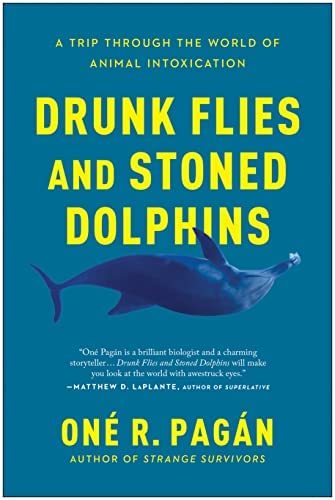
136. Drunk Flies and Stoned Dolphins by Oné R. Pagán. This book is about pharmacology, the possible evolutionary benefits of drug use, and the documented cases of animals using drugs, both in lab and wild settings. It might be partially because I’ve read a lot of books on similar topics, but this one stood out to me only in that I didn’t like the authorial voice. It felt vaguely condescending. The book is mostly a literature review, and not a particularly engaging one at that. There were some studies I was unaware of (like a follow-up study to the infamous “elephant on acid” experiment), but overall I wasn’t impressed.
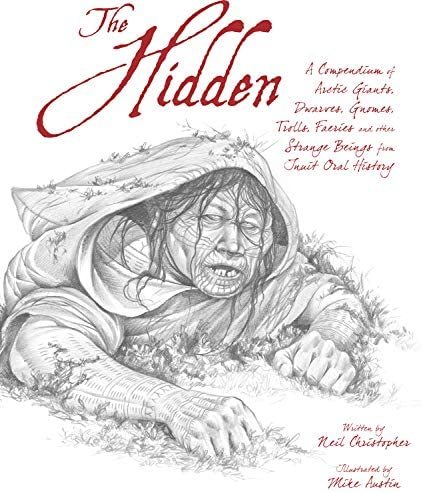
137. The Hidden written by Neil Christopher, illustrated by Mike Austin. This is a book about Inuit mythology and folklore, primarily looking at anthropomorphic gods and other humanoids: giants, fairies, hags, etc. The book has descriptions of the monsters in question, and quotes from tales told to the author over the course of his research. The writing is good, but the art is better. Austin has a very naturalistic style, making the various trolls, dwarves and deities within look like actual people, and actual Inuit people, with authentic dress and features. For people interested in the cultures of the American Arctic, and/or for people interested in monsters, this book is highly recommended.
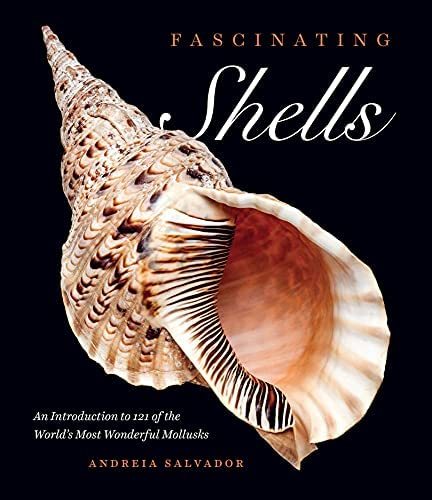
138. Fascinating Shells by Andreia Salvador. This book is similar to The Smithsonian Handbook of Interesting Insects, in that it’s a reprint of a British book showcasing photos from the London Natural History Museum, with a paragraph or so of text for each specimen. I liked this book much more than that one. Possibly because I know less about mollusks so am less judgey about books on the subject, possibly because Fascinating Shells had only one author, as opposed to the four (!) of Interesting Insects. The shells are organized loosely taxonomically (in that gastropods are grouped together, then bivalves, etc., but not within clades). Some of the information in the paragraphs of text are about biology, and others are focused on the cultural history of that species or specimen.
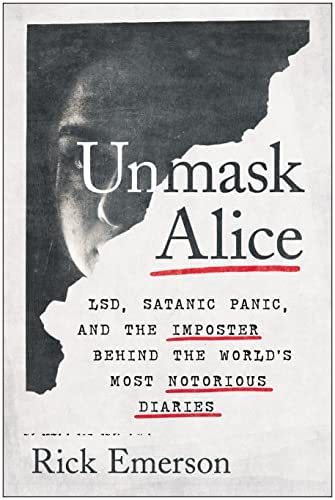
139. Unmask Alice by Rick Emerson. This is one of those true crime books that reads like literary fiction, and this is also one of those true crime books that shows empathy for the survivors and the victims. The topic is Beatrice Sparks, a literary ghoul who preyed on the fears of adults about children to push fearmongering about teen runaways, LSD and Satanism, and who preyed on the grieving family of a teenager who committed suicide for fodder for her lurid forgeries. Those forgeries, books like Go Ask Alice and Jay’s Journal, masqueraded as “true stories”, while Sparks claimed to be a doctor of psychology. Emerson argues that Jay’s Journal was Patient Zero for the Satanic Panic, which is not an angle on that moral panic I had heard before.
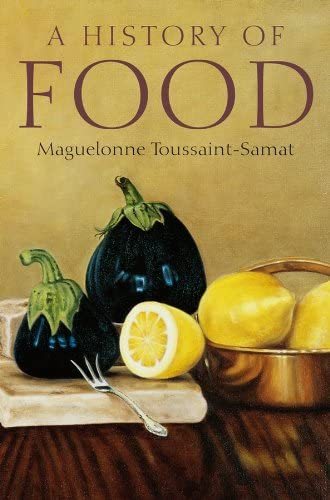
139a. A History of Food by Maguelonne Toussaint-Samat, translated by Anthea Bell. This is another book that’s not necessarily bad, but I put down because it is way too long and too dense for me at the moment. It’s 675 pages of stream of consciousness about culinary history, making all sorts of broad, universal claims with very little citation to back it up. There’s a “select bibliography in English” rather than an actual works cited, which seems somewhat suspicious to me. To give you an example, the book begins by talking about means of cooking in bags and skins before ceramics or metalworking, then moves to honey, which is the “first food” because of its role in a handful of myths, not actual history, then a detailed history of French spice bread and the rivalries between towns, followed by some information about mead making. I could see myself coming back to this book at some point, but I have many other books to read, and do not especially have the patience to sift through the author’s very dense and florid style.

140. Action Park by Andy Mulvihill with Jake Rossen. This is the memoirs of one of the sons of the man who created and ran Action Park, a New Jersey water park where safety, logic and insurance requirements were not welcome at the gates. The book soft-pedals Gene Mulvihill’s many crimes and indiscretions in favor of an “all in good fun” sense of nostalgia, which sort of makes sense because the main author is his son and worked at the park. You can almost see the author struggling with cognitive dissonance when writing about the deaths and more grisly accidents on park grounds. The book ends with an epilogue of how he briefly ran the park before being pushed out by investors, and comes close to, but not quite, being a rant about how the snowflakes in the government won’t let people give themselves whiplash anymore. There’s some fun sections (such as the opening, which is a description of going down the infamous Cannonball Loop, and the trial run of the too-dangerous-even-for-Action-Park Bailey Ball), but you’d probably have more fun and use less time reading the Wikipedia page or watching YouTube videos on the topic.
#reading log#action park#poor life choices#food history#inuit folklore#animal behavior#drugs are like that#true crime#satanic panic#marine invertebrates#mollusk
18 notes
·
View notes
Photo





Can You Ever Forgive Me? (Marielle Heller, 2018)
Cast: Melissa McCarthy, Richard E. Grant, Dolly Wells, Ben Falcone, Gregory Korostishevsky, Jane Curtin, Stephen Spinella, Christian Navarro, Anna Deavere Smith. Screenplay: Nicole Holofcener, Jeff Whitty. Cinematography: Brandon Trost. Production design: Stephen H. Carter. Film editing: Anne McCabe. Music: Nate Heller.
Lee Israel, the subject of Can You Ever Forgive Me?, has a sour view of humankind, which she feels has rejected her talents as a writer. She looks to get even with the literary world -- and to shore up her dwindling income -- by forging letters from the likes of Fanny Brice, Noël Coward, and Dorothy Parker. And she has just enough talent to bring it off. Melissa McCarthy is superb in the role, which earned her an Oscar nomination; she knows when to soften Lee's hard edges, so that we don't lose complete sympathy for her. And it helps that she has the fine character actor Richard E. Grant, who also got an Oscar nomination, to play off of: Grant's seedy layabout, Jack Hock, is just a few moral levels below Lee, making him the perfect foil for her character. Can You Ever Forgive Me? is only Marielle Heller's second film as a director, and it's nicely paced, except for a few moments when it feels as if something has been left on the cutting-room floor. The introduction of Anna Deavere Smith as Elaine, Lee's friend and apparently her former lover, seems to come out of nowhere and linger there awkwardly. But Heller also handles the sexual tension that develops between Lee and Anna (Dolly Wells), the bookseller who buys Lee's first forgery, with subtlety: We sense Anna's quiet disappointment when Lee walks away from her shy attempt to make a move. Can You Forgive Me? feels a little ragged in its resolution, as if the film has run out of story to tell once Lee has been caught, and it ends with the usual title summaries of what happened to the real-life Lee and Jack, a crutch that biographical films too often rely on. But it's full of witty moments and performers who make the most of them.
9 notes
·
View notes
Text
0 notes
Text
<< A poem’s diction may be an authentic index of its class affiliation—that is one way to read class through diction—yet the sociality of diction can also become evident, paradoxically, through falsehood and duplicity. As a marker of class or racial identity, diction can be faked, which marks an essential difference from form. Form cannot be fabricated, diction can—a condition essential to its potency as a means of social expression. And motives for fabrication are manifold. A poem may craft a synthetic vernacular as a source of authenticity. It may also fabricate a vernacular as an object of ridicule and contempt (as in the verbal formulae of white trash or blackface minstrelsy). Yet a clear distinction between authentic and fake—if indeed such a distinction exists on the page—may be difficult to identify or demonstrate in the framework of a poem.
In fact, the emergence of vernacular language into the poetic tradition via the ballad revival of the 18th century illustrates that imposture and forgery have always been intrinsic to the production of a poetic vernacular, even in its most authentic forms, by “native” speakers. The potentially fraudulent character of diction functions as a primary dimension of its social expressivity—one that may expose the operation of class conflict within the poem. Indeed, with the gradual extinction of the verbal markers of subalternity (the hastening disappearance of dialects and accents), the production of vernaculars may now always be a contrivance—and always politically motivated.
As a critical framework, diction can reveal the social complexion of any poem (whether authentic or contrived), but it may be especially useful in exposing the class affiliations of some recent vanguard poetry that fuses demotic and commodified phrasings with scraps of “theory,” or academic vocabulary, in the service of political critique. This poetry seeks—in the wake of the collapse of blue-collar culture—to invent a cross-class language of fugitive or infidel sympathies, drawing on a range of international subcultures, traditions, and jargons. In its verbal and sometimes sexual syncretism, this fabricated language of the “underneath” can be seen as queering the diction of poetry. >>
1 note
·
View note
Text
Portrait of an Unknown Lady by María Gainza

This was, unfortunately, in many ways a novel where the synopsis sounds more interesting than the book actually is. That said, once I accepted this for what is was (literary fiction) and not what I thought (thriller/mystery) I did appreciate it. I liked the shifting timelines and the discussions around art, forgery and identity.
genres: literary fiction
translator: Thomas Bunstead
rating: ★★★
goodreads synopsis:
In the Buenos Aires art world, a master forger has achieved legendary status. Rumored to be a woman, she seems especially gifted at forging canvases by the painter Mariette Lydis, a portraitist of Argentine high society. But who is this absurdly gifted creator of counterfeits? What motivates her? And what is her link to the community of artists who congregate, night after night, in a strange establishment called the Hotel Melancólico?
On the trail of this mysterious forger is our narrator, an art critic and auction house employee through whose hands counterfeit works have passed. As she begins to take on the role of art-world detective, adopting her own methods of deception and manipulation, she warns us “not to proceed in expectation of names, numbers or dates . . . My techniques are those of the impressionist.”
What follows is a highly seductive and enveloping meditation on what we mean by “authenticity” in art, and a captivating exploration of the gap between what is lived and what is told. Portrait of an Unknown Lady is, like any great work, driven by obsession and full of subtle surprise.
0 notes